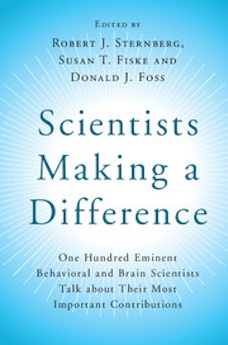By Douglas Keith Candland
Psychology, lacking a unified epistemology, historically has borrowed from whatever scientific discoveries sway other sciences. When hydropower moved statues at Versailles, psychology rediscovered the power of body humors; when electricity proved itself capable of marvelous achievements, Freud’s theory of mind (id, superego, ego) mimicked Ohm’s law (power, resistance, output); when binary computing proved efficient, so was the central nervous system re-magined.
Our contemporary understanding of psychology is much influenced by what is called ‘cognitive psychology’, a term everyone uses and no one defines. In practice, it most resembles 19th century metaphysics, but it is, in contemporary use, capable of clever and demonstrative research that forms a bridge to neuroscience, the study of the central nervous system and behavior; hence, the overly general title of the book under review.
It is easy to describe the book; a wholly different task to evaluate it, as it is at once a fruitful read, an historical document, and a lesson in the art of the essay. One hundred folks regarded as most ’eminent in psychology’ were given five questions about their lives and major contribution. Each eminence prepared a short reply of three or four printed pages. The resulting essays are book-ended by an equally brief preface and afterword by two psychologists now in university administration. The editors’ preface to Scientists Making a Difference; One Hundred Behavioral and Brain Scientists Talk about Their Most Important Contributions fails to mention psychology even though the preface begins with the rhetorical question, “What do research psychologists do?”
Each of the one hundred essays is charming, instructively like unhappy families, each charming in its own way. Such is a strength of the book for the reader interested in literary style. Only two or three authors cannot resist the invitation for primping, while most express gratitude for their eminence by mentioning an exciting education and teachers, along with gratitude toward students and co-workers. The discoveries written about are not big, encompassing theories, capable of pulling together vastly different findings, but smaller, intimate, research findings, phenomena in need of big theory. Taken together, their strength is in showing the breadth of knowledge emanating from psychological studies. They are studies of a particular type that, upon this reader’s reflection, describe the researches about the mind that are characteristic of a time and place, evidence again of how dependent psychology is upon the epistemologies that are successful in other fields.
The reader will come to think that action in contemporary ‘behavioral and brain science’ is principally in what is called social psychology; i.e., the interactions of individuals in groups and of groups themselves, and in cognitive psychology, that field that attempts to understand just how the mind works. There is a reason for this:
The large plurality of research contributions was made in the period from the late 1960s to the early 1980s, a counting that shows how long it takes for a contribution to find its way into the canon of psychology and become worthy of coverage in the typical introductory text. What the essays reflect is the seemingly sudden conversion of research psychology into something called the cognitive revolution that appeared in the late 1960s and which still predominates research in psychology, although neuroscience is currently showing a strong hand. There are, to be sure, stimulating essays on discoveries in neuroscience, linguistics, and mental health, but evidently ‘behavioral and brain science’ does not include discoveries regarding nonhuman comparative psychology, tests and measurement, other psychological matters surely important to the growing field of race and social class studies.
It is a pity and a loss that no one thought to assign such essays in earlier times. The 1930s-1950s would have been dominated by ‘rat and pigeon’ psychology, the earnest attempt to determine how organisms learn, or the 1880s-1920s when psychology was moving away from philosophy and worried about the unconscious. Were such an attempt to be made in 2050, I suspect the identifier ‘psychology’ would, be missing (as it is in the title of the present work) because it will have been absorbed by neurology and sociology. As it is, the essays form a magnificent and engaging presentation of what is now called cognitive psychology. Readers interested in where psychology was and is, and the art of the essay will find this work a choice and unusual opportunity for self-education.
Douglas Keith Candland (ΦBK, Pomona College, 1956) is the editor of Review of General Psychology and the Homer P.Rainey Professor of Psychology and Animal Behavior, Emeritus at Bucknell University. Bucknell University is home to the Mu of Pennsylvania chapter of Phi Beta Kappa.




